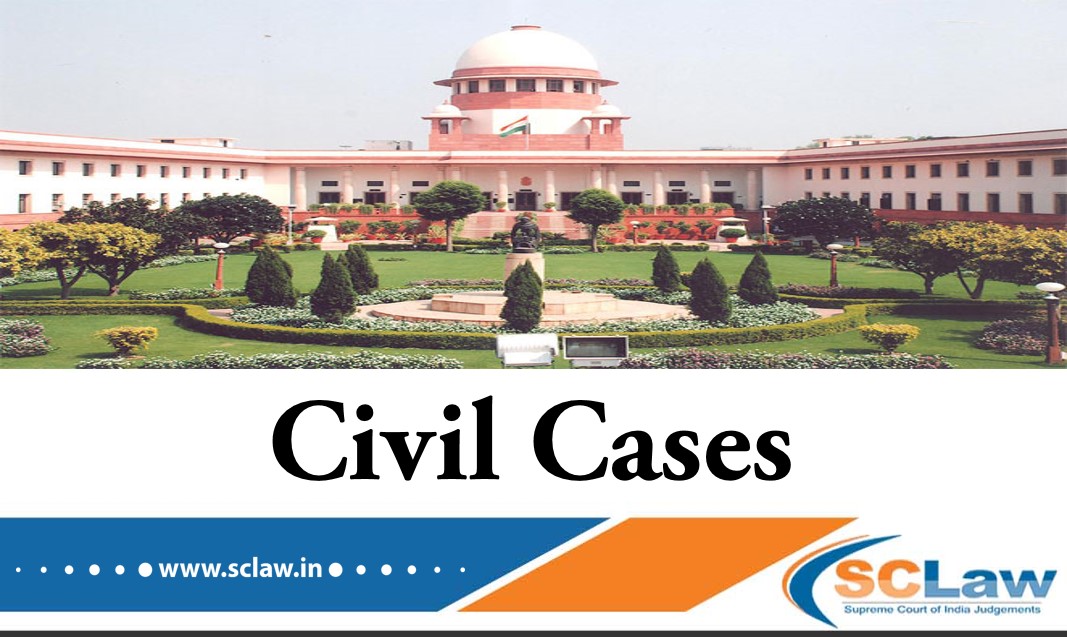Oral Agreement to Sell–Specific Performance–Defence under Section 53(A) of the TP Act is not available to a party who alleges to be in possession of the property.
2007(2) LAW HERALD (SC) 1291 IN THE SUPREME COURT OF INDIA Before The Hon’ble Mr. Justice Arijit Pasayat The Hon’ble Mr. Justice Lokeshwar Singh Panta Civil Appeal Nos. 8303-8304 of…
Written Statement–Amendment of–Courts should be liberal in granting the prayer for amendment of pleadings unless serious injustice or irreparable loss is caused to the other side.
2007(2) LAW HERALD (SC) 1281 IN THE SUPREME COURT OF INDIA Before The Hon’ble Mr. Justice Tarun Chatterjee The Hon’ble Mr. Justice R.V. Raveendaran Civil Appeal No. 2019 of…
Withdrawal of Suits–When the court allows the suit to be withdrawn without liberty to file a fresh suit–It cannot debar the petitioners from taking the defence in the second round of litigation.
2007(2) LAW HERALD (SC) 1276 IN THE SUPREME COURT OF INDIA Before The Hon’ble Mr. Justice Arijit Pasayat The Hon’ble Mr. Justice S.H. Kapadia, Civil Appeal No. 5107 of…
Revenue Law–Entries in the Revenue Records or Jamabandi have only ‘fiscal purpose’ i.e. payment of land-revenue, and no ownership is conferred on the basis of such entries. (A) Delhi Land Revenue Act,1954, Sections 29 & 31–Mutation in Revenue Rec
2007(2) LAW HERALD (SC) 1272 IN THE SUPREME COURT OF INDIA Before The Hon’ble Mr. Justice C.K. Thakker The Hon’ble Mr. Justice P.K. Balasubramaniyan. Civil Appeal No. 1971 of…
Misjoinder of plaintiffs or misjoinder of cause of action—Objection as to— It is a procedural objection and it is not a bar to the entertaining of the suit or the trial and final disposal of the suit. Misjoinder of plaintiffs or misjoinder of cause of action—Held; By no stretch of imagination such a defective suit be held to be barred by any law.
2007(2) LAW HERALD (SC) 1263 IN THE SUPREME COURT OF INDIA Before The Hon’ble Mr. Justice S.B. Sinha The Hon’ble Mr. Justice P.K. Balasubramaniyan Civil Appeal No.446 of 2007…
Pre-emption — Validity — Plaintiff not a co-sharer of her father — She could not have claimed a right of pre-emption on the basis of consanguinity
2007(2) LAW HERALD (SC) 1257 IN THE SUPREME COURT OF INDIA Before The Hon’ble Mr. Justice S.B. Sinha The Hon’ble Mr. Justice Markandey Katju Civil Appeal No. 5947 of…
Acquittal–While dealing with a case of acquittal, the High Court shall not ordinarily overturn a judgment if two views are possible
2007(2) LAW HERALD (SC) 1251 IN THE SUPREME COURT OF INDIA Before The Hon’ble Mr. Justice S.B. Sinha The Hon’ble Mr. Justice Markandey Katju Criminal Appeal No. 1622 of…
Bail—Fake stamp papers—Accused helped Telgi in jail in contravention of prior rules—Bail granted.
2007(2) LAW HERALD (SC) 1249 IN THE SUPREME COURT OF INDIA Before The Hon’ble Mr. Chief Justice K.G. Balakrishnan The Hon’ble Mr. Justice R.V. Raveendaran Criminal Appeal No. 574…
Agreement to Sell—Rise in prices of property thereafter—Specific performance of agreement—Rise in the price of an immovable property by itself is not a ground for refusal to enforce a lawful agreement of sale.
2007(2) LAW HERALD (SC) 1243 IN THE SUPREME COURT OF INDIA Before The Hon’ble Mr. Justice S.B. Sinha The Hon’ble Mr. Justice Markandey Katju Civil Appeal No. 6925 of…
Joint Hindu Property—Partition—Even separate possession of portion of the property by the co-sharers itself would not lead to a presumption of partition. First Appeal—The appellate court, if it seeks to reverse those findings of fact, must give cogent reasons to demonstrate how the trial court fell into an obvious error.
2007(2) LAW HERALD (SC) 1237 IN THE SUPREME COURT OF INDIA Before The Hon’ble Mr. Justice S.B. Sinha The Hon’ble Mr. Justice Markandey Katju Civil Appeal No. 6198 of…












